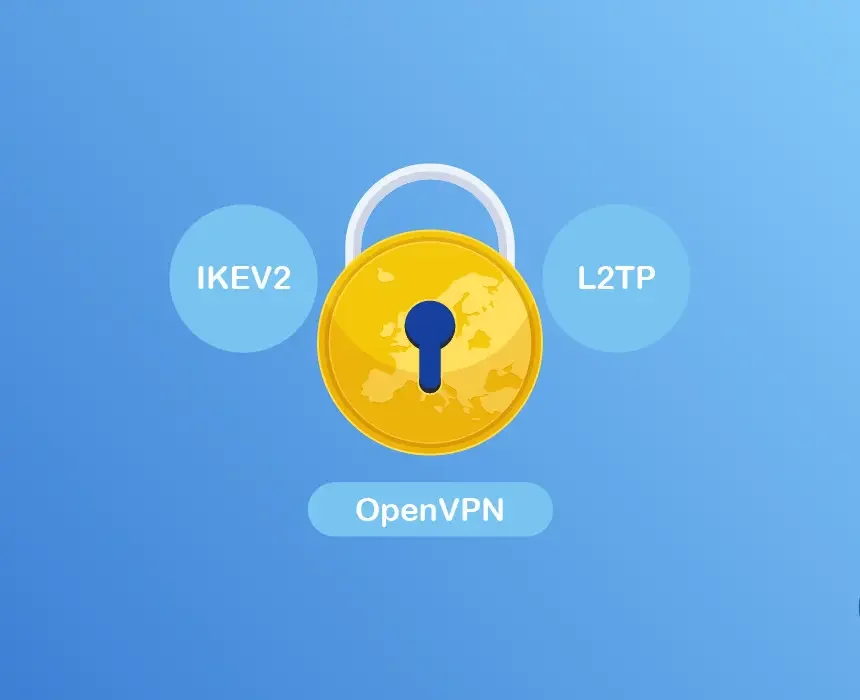
The spiking censorship and regulations that threaten global internet freedom compels people to rely more on services that protect their internet activities. Virtual Private Networks (VPNs) have become increasingly popular in recent times to overcome these restrictions. A VPN does this by creating a tunnel between the device you are using and the internet, thereby encrypting the data packets sent by your device. The level of encryption depends on the type of protocol your VPN uses to encapsulate and encrypt the data transferred to and from your device and the internet. A VPN protocol can be defined as a set of rules that negotiate the connection between the VPN client and the VPN server. VPN providers offer different types of protocols, which offer varying levels of security, such as OpenVPN, IKEv2, and L2TP.
OpenVPN is an open-source protocol that supports all the major operating systems. It is the most popular and widely recommended VPN protocol. It is highly configurable for different ports and encryption types. OpenVPN uses the OpenSSL encryption library and SSL v3/TLS v1 protocols.
OpenVPN is difficult to block. It can run on any port, such as 443 HTTPS port and use both Transmission Control Protocol (TCP) and User Datagram Protocol (UDP) protocols. This cushions users from the prying eyes of hackers, government regulators, ISPs, and advertising agencies. VPN providers use different encryption methods, such as AES encryption, HMAC, and OpenSSL to their tunneling process.
The TCP is the most commonly used protocol with OpenVPN. While using TCP, the sender awaits confirmation before sending the next packet. This transmission slows down the connection. UDP is an alternative protocol. The communication between the computer and the server is faster. OpenVPN TCP offers better reliability and bypasses Firewalls easily as they run on common ports 80 and 443. OpenVPN UDP gives faster speed and is recommended for streaming HD videos and downloading content. OpenVPN TCP offers a more stable connection and guarantees the delivery of packets whereas OpenVPN UDP is less reliable and does not guarantee packet delivery.
OpenVPN requires third-party software since it is not natively integrated into Operating Systems. However, most of the VPN clients serve as third-party software. A majority of the VPN providers offer customized OpenVPN configurations and allow users to customize their own configuration.
Internet Key Exchange version 2 (IKEv2) is one of the latest VPN protocols developed by Cisco and Microsoft. It is suitable for mobile platforms across all devices. IKEv2 is seen paired with IPSec for encryption and authentication.
It handles the Security Association (SA) attribute to support secure communication between two network entities. It handles the network changes so well that your VPN connection will remain stable while switching your internet from a Wi-Fi connection to a data plan on your mobile device or vice versa.
IKEv2 is comparatively fast, stable, safe, and easy to set up. IKEv2 supports different levels of AES encryption and it uses the IPSec encryption suite.
Layer 2 Tunneling Protocol (L2TP) is paired with Internet Protocol Security (IPSec) protocol. This protocol is extremely secure and uses double encapsulation.
L2TP/IPSec is an improved version of PPTP. Double encapsulation of L2TP makes it more secure. But it is slower compared to PPTP. L2TP does not provide encryption on its own. Hence it is always paired with IPSec. L2TP offers better security if it uses AES cipher.
L2TP/IPSec is easy to configure. Most of the VPN providers further configure the protocol to ensure that it cannot be blocked by NAT firewalls. Such a set up ensures the safety of the setup from man-in-the-middle attacks. L2TP protection is a two-step process. The traffic should be first converted to L2TP form and then encryption is added on top with IPSec. But the connection can be hindered due to traffic conversion.
Identifying the best protocol primarily depends on the needs of the users. A VPN is used to safeguard privacy, which is the key aspect of a VPN service. The overall performance of a VPN-enabled web traffic protection depends on the type of protocol used. Most of the experts recommend OpenVPN protocol. It is faster, reliable, and secure. Its cross-compatibility on multiple devices and OS makes it a preferred protocol among VPN users. However, OpenVPN requires a third-party application to function. In such cases many turn to IKEv2 or L2TP. Security, speed, connectivity, and reliability are the key factors that determine the performance of a VPN protocol. The availability of the protocol on different OS or devices also matters.

Businesses today are operated, regulated, and grown via data and other online resources such as servers. For a business to do this optimally, these resources have to be secured. A fundamental part of…
29 July 2022
In today's interconnected digital landscape, where businesses increasingly rely on cloud infrastructures to store their network resources and applications, ensuring data security has become param…
20 July 2023
Despite the common belief that cyber-attacks are always focused on medium to large businesses and small businesses are spared from cyber-attacks owing to their comparatively smaller fortunes, it is t…
30 August 2023